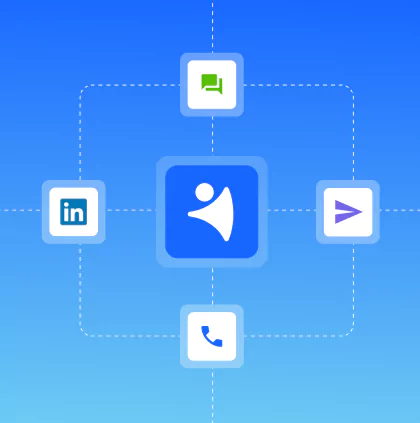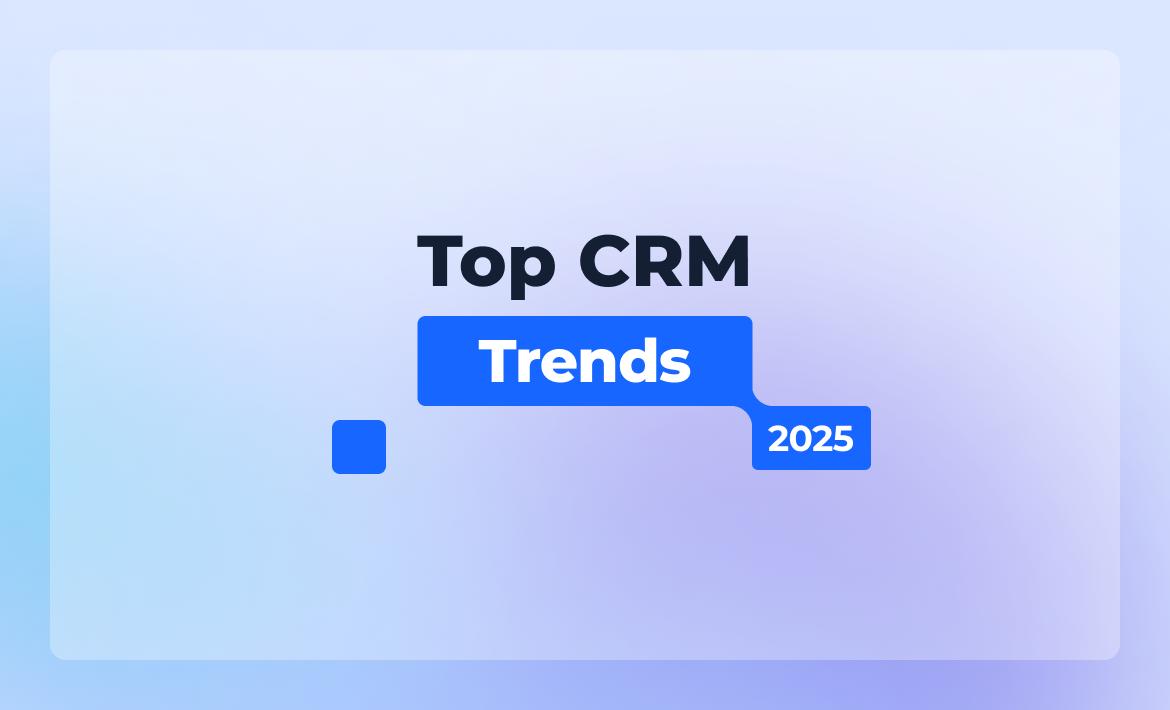The CRM market is booming! CRM software revenue is projected to hit $98.84B by 2026, and the competition is fierce. Everyone’s racing to innovate, redefine boundaries, and outpace the rest in this fast-moving industry.
But with so many options, how do you choose the right CRM? What features matter most? And how can you tell if your provider truly delivers what you need?
We’ve got you covered. In this article, we dive into the top CRM trends of 2026 and how they’ll shape your business. Let’s explore!
#1: Business workflow automation
No feature has been more impactful in NetHunt's history than Workflows.
Workflows revolutionized the way businesses handle repetitive tasks. With its beautifully simple, modular design, our Workflow Builder transforms manual processes into seamless, automated operations.
From the big jobs like email drip campaigns and remembering to follow up, to the little things like moving a lead to the next stage of the pipeline based on a deal event, Workflows by NetHunt CRM is an absolute game changer.
As we step into 2026, we can only expect even more CRM processes to be automated.
So. here we’ve gathered the latest trends in CRM automation poised to redefine the industry in 2026:
- More no-code workflow automation or low-code workflow builders would empower users to create complex workflows without much tech assistance.
- Hyper-personalization is definitely one of the top trends in CRM. So, businesses will be looking for CRM solutions that allow them to trigger personalized actions based on customer data, preferences, and behavior within the CRM
- Also, expect higher focus on customer experience. Businesses will look for CRM solutions with functionality that includes real-time support, automated customer data collection and analysis, automation of routine tasks, and more
A Pro Tip from our CEO:
"Be careful not to over-automate your processes. Yep, it’s a cool feature, but the point is that CRM helps you to manage your customer relationships. You don’t want to lose that human touch, many have gone before and found out the hard way."
- Andrei Petrik, CEO of NetHunt CRM
…. And that leads us to the next trend — omnichannel communication or ‘Social’ CRM as one of the top CRM marketing trends to look for in 2026.
#2: Social CRM and multichannel strategies
A social media CRM strategy - wherever it is executed - is critical for most businesses, especially with CRM software trends showing that competitors are already leveraging similar strategies to stay ahead. Besides keeping up with the other guys, a social CRM provides key benefits for any business.
Here is what businesses would value in a social CRM in 2026:
- Tells you more about your audience so you can gather than valuable data and build a more effective marketing strategy
- Helps you automatically capture and nurture leads from multiple channels (say hi to personalized campaigns)
- Provides real time feedback on a product or service aka real-time sentiment analysis
- Offers new and emerging communication channels with quick and easy integration
For instance, NetHunt CRM natively integrates with multiple social media platforms and messengers. You can capture leads from all those channels and automatically create neat customer records filled with the publicly available data.
Plus, you can communicate with your social media leads and manage the inbox right within the CRM.
A Pro Tip: Choose a social CRM with NATIVE integrations. Why? Because using a third-party tool isn’t only cumbersome but also might compromise your data security. If your CRM provider isn’t offering the integrations you need, don’t worry — we’ve got an impressive list of top-tier NetHunt integrations, with even more on the way.
Now let’s talk about data security as one of the top CRM software trends.
#3: More data privacy
Data protection is surely one of the CRM industry trends that would never disappear because data is everywhere. Customers subscribe to your business, trading their data; they fill in web forms, apply for demos, and even have their data scraped from social profiles by businesses. We do it all for the greater good, but there are some ethical issues that come with being in possession of somebody’s data. They deserve to have it looked after and used in the correct way.
We can already find passwords, unsubscribe buttons, and forget-me features. How about built-in encryption, two-factor authentication, offline mode, and malware protection in 2026?
Apart from the enhanced emphasis on data privacy regulations (remember the notorious GDPR regulations), we expect these current trends in CRM data security to shine even brighter in 2026:
- CRM providers would invest in functionality that helps businesses identity cyber threats like phishing, malware, and ransomware faster plus prevent data loss.
- Zero Trust Security will get even more popular, meaning that no user or device is automatically trusted. Companies would invest more in CRM technologies that pay high attention to practices like continuous authentication, micro-segmentation, and least privilege access.
- There will be a greater focus on giving customers control over their data, allowing them to access, update, and delete it easily.
Now let’s talk about the elephant in the room that will help make all that business automation and data security possible.
#4: AI will stay among the top CRM market trends
First of all, not everything labeled as AI is ultimately a good thing. Sometimes an old-fashioned CRM with no AI features is better. Why? Because it’s easier to navigate, poses less threat to your data, and gives you more control over your workflows.
Anyway, we’re here to praise one of the recent trends in CRM that will stay with us for years to come. So, here is what we can expect from AI in CRM:
- AI will optimize lead scoring and automate sales forecasting
- AI-powered chatbots for better customer experience + AI-powered sentiment analysis
- Predictive analytics for more impactful decisions
- AI will use customer data to offer tailored recommendations, content, and promotions for ultra-personalized customer experience
#5: Individual CRM
Everybody’s out here on their entrepreneur flex.
After all, maybe you don’t need the big office in Silicon Valley to be a success. Maybe you’re just one person with a laptop and a set of tools looking for the most simplified CRM on the market. For instance, in real estate, it’s not unusual to meet a real estate agent who uses an individual CRM to manage their projects and be more competitive.
The point is that a CRM system isn’t just useful for massive teams. Solopreneurs have equally good reasons to use CRM. Entering client information, sending emails, answering customer questions, and scheduling meetings with clients; they also need a pipeline tool to manage deals , a calendar to stick to, and invoices to fire out.
So, what will individual CRM as one of the latest CRM trends have in 2026?
- No-code or low-code approach
- Lower costs
- Simplified user management, access control, and team collaboration features
- Minimal security controls as there is only one user (and no, it’s not a blessing in disguise but a potential threat to your sensitive data)
#6: Hello, self-service CRM
We realize that we’re always telling you to personalize your customer experience, speak in the customer’s language, provide a top-notch customer service, and guide them through the B2B sales process one step at a time. But…
67% of customers prefer to use self-service options instead of a company representative.
Source: Zendesk
A self-service CRM is a tool that offers customers the capabilities to perform many standard tasks, such as setting up accounts and paying bills, without the help of a service representative. They can answer their own questions and troubleshoot their own problems on their own terms and in their own time. It’s all about speed and it’s a hands-off approach to customer relationships.
Pro Tip: Here is a guide on how to make a self-service product.
- Visualize product training for customers and make it accessible aka a help center with video guides and tutorials
- Add a bit of automation aka chatbots to assist with simple queries
- Ensure your customization options are simple and don’t require much tech expertise
- Include an option to speak to an agent or book a consultation by themselves
- Ensure mobile access
- Build a user community online
#7: A larger slice for smaller CRM providers
A pretty unexpected item on our list of CRM market trends.
CRM is the fastest-growing SaaS market, expected to top over 128 billion dollars by 2028. There are gigantic, transnational corporation CRMs like Salesforce CRM, HubSpot CRM, and Microsoft CRM; there are also smaller CRM providers like NetHunt CRM.
Big CRM companies might have the reach, the resources, and the experience in providing CRM, but here is what they don’t do:
- No niche specialization
- No competitive pricing structures
- Lack of personal customer service
- Don’t prioritize customer success and are generally less responsive to customer feedback
For instance, at NetHunt, we listen to individual requests for features and implement them without the red tape and bureaucracy of larger providers.
Sometimes our devs themselves ring customers to get to the bottom of an issue!
Plus, smaller CRM providers are perfect for small businesses because they share a common goal: organizing and growing independently. This shared perspective creates a strong partnership as both work together to succeed. Smaller CRM providers are on the rise!
#8: More industries will use CRM
CRM used to be a glorified database, a pretty Rolodex to store your sales contacts. But now, it’s a powerhouse of sales and marketing management. In fact, 91% of companies with more than 11 employees use a CRM system.
The latest trends in CRM market will change. At the moment, over 50% of CRM subscribers work in one of four markets: real estate, consulting, distribution, and insurance. Currently, retail has the highest CRM usage, but we expect to see CRM make the working days of other industries simpler. Think healthcare, finance, and manufacturing. A lot of existing CRM functionality already fits with the processes of those companies — all it takes is one forward-thinking CRM developer to design the next features to fit exact economies.
#9: XaaS: Whatever as a service
XaaS, short for "Everything as a Service," goes beyond traditional SaaS (Software as a Service) CRM for SaaS companies in our case. It’s a transformative model where any tool, application, or service can be delivered from the cloud under one seamless platform.
Here is what businesses should expect from one of the latest CRM software trends:
- More agility and scalability. Businesses can add or remove software features on-demand without large upfront investments.
- AI-powered intelligence. With XaaS, CRM providers can integrate AI to predict customer churn, personalize interactions, and automate routine tasks like lead scoring and data entry.
- More focus on integrations. Cloud CRM software providers will offer more integrations with marketing, e-commerce, and social media platforms.
- Subscription-based models for predictable costs. CRM providers will offer even more flexible solutions when it comes to pricing structures and add-ons.
Final thoughts
As we look to the future, it’s clear that CRM trends shaping the industry in 2026 will prioritize smarter automation, enhanced data security, omnichannel communication, and more accessible solutions for businesses of all sizes.
Anyway, the competition is fierce, but the opportunities are boundless. Here’s to 2026!




















 product experts — let's find the best setup for your team
product experts — let's find the best setup for your team